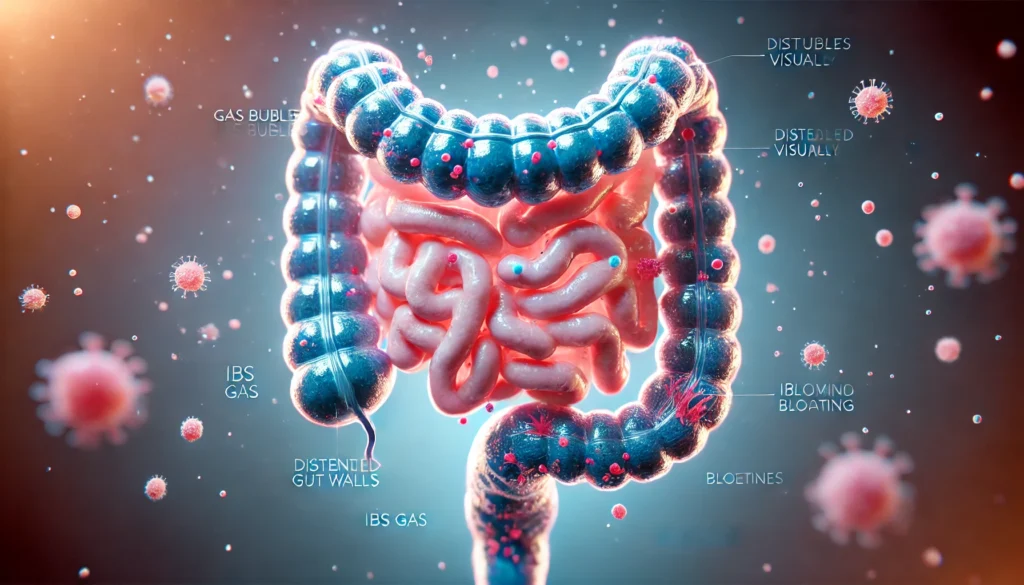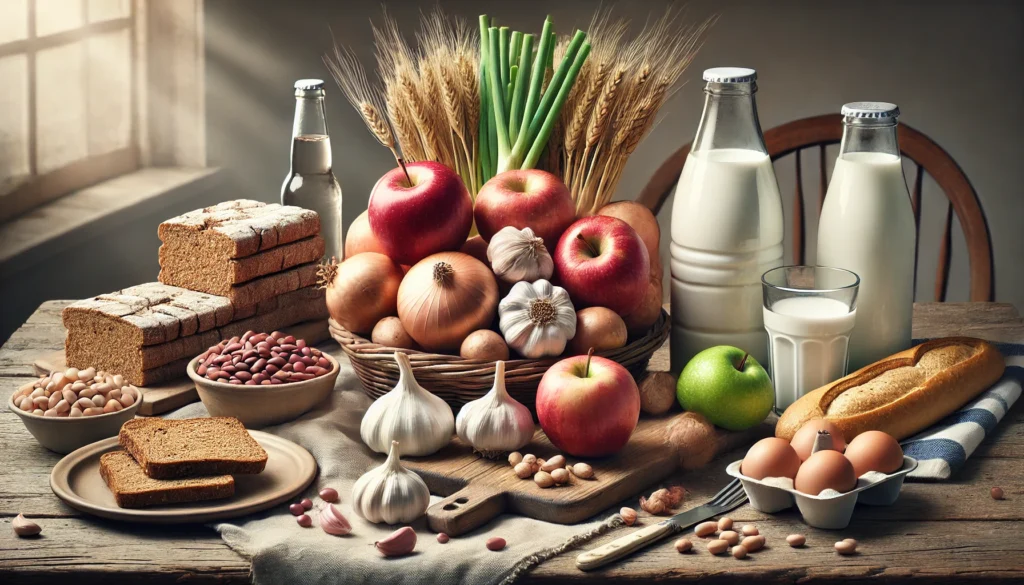Introduction
Irritable Bowel Syndrome (IBS) affects approximately 10–15% of the global population, and yet, for many sufferers, it remains a misunderstood and mismanaged condition. At its core, IBS is a disorder of the gut-brain axis—a complex interaction between the gastrointestinal system and the central nervous system. It presents in different forms such as IBS with constipation (IBS-C), IBS with diarrhea (IBS-D), and mixed-type IBS (IBS-M), but among all these, the most common and distressing symptoms include persistent bloating, abdominal discomfort, flatulence, and overwhelming fatigue.
You may also like: The Science of Gut Repair: How to Heal Leaky Gut Syndrome Naturally with a Proven Gut Healing Diet
The daily experience of IBS and gas can be both physically and emotionally draining. Gas accumulation in the intestines contributes not only to discomfort and visible bloating but also to anxiety and social withdrawal. When episodes of IBS flatulence become frequent or uncontrollable, patients often report embarrassment and a diminished quality of life. Compounding the distress, IBS doesn’t just affect digestion—it affects energy levels, leading to what is often described as IBS tiredness fatigue. This fatigue isn’t the typical post-lunch slump; it’s an all-encompassing exhaustion that doesn’t improve with rest and often coexists with brain fog, low motivation, and sleep disturbances.
Identifying IBS triggers is critical for anyone trying to manage symptoms. Though commonly associated with diet, triggers can also include stress, hormone fluctuations, sleep disruption, and medications. Yet among all factors, diet remains one of the most actionable. Understanding what foods cause IBS, and more specifically, what foods trigger irritable bowel syndrome, can offer a practical and empowering route toward symptom relief. However, this process isn’t as simple as avoiding fast food or dairy. It requires a deep understanding of food sensitivities, fermentable carbohydrates, fiber types, and how personal gut flora reacts to different nutrients.
This comprehensive, research-based article delves into the causes of IBS-related gas and fatigue, identifies known and lesser-known IBS triggers, and explores the specific foods that commonly provoke symptoms. Whether you’re newly diagnosed or have been managing IBS for years, this guide will provide the tools and insights you need to better understand your body and reclaim your vitality.

Understanding IBS and Gas: Why It Happens and What It Means
For many people with IBS, excessive intestinal gas is one of the earliest and most persistent symptoms. The bloating and pressure from trapped gas can cause significant abdominal distension, cramping, and discomfort. In fact, IBS flatulence often dominates the daily experience of the condition—becoming a source of shame, social anxiety, and physical pain.
So why does IBS and gas go hand in hand? First, individuals with IBS often experience altered gastrointestinal motility. This means that food moves either too quickly or too slowly through the intestines, causing fermentation at inappropriate stages of digestion. When undigested carbohydrates reach the colon too soon, they become fuel for bacterial fermentation, releasing gases such as hydrogen, methane, and carbon dioxide.
Secondly, many IBS sufferers experience visceral hypersensitivity. This term refers to an increased sensitivity of the nerves in the gut wall. In practical terms, this means a normal amount of gas or pressure—which would go unnoticed by someone without IBS—can feel extremely painful or overwhelming. Even a small buildup of gas can be perceived as sharp pain, bloating, or urgency to use the bathroom.
Research also shows that those with IBS may have an altered gut microbiota. When the delicate balance of bacteria is disturbed (a condition known as dysbiosis), fermentation becomes more aggressive, leading to excess gas production. Certain strains of bacteria may release more gas, or may be more prone to consuming fibers that produce gas as a byproduct. This is often seen in conjunction with Small Intestinal Bacterial Overgrowth (SIBO), a condition where bacteria migrate to the small intestine and ferment food prematurely.
The result is a vicious cycle: gas causes pain and discomfort, which leads to stress, which in turn worsens IBS symptoms. Understanding the root of IBS and gas is key to breaking this cycle and finding lasting relief.

IBS Triggers: Internal and External Contributors
Managing IBS effectively begins with understanding its many triggers. While many patients immediately point to food as the main cause of flare-ups, IBS is often influenced just as strongly by internal and external environmental factors.
One of the most powerful IBS triggers is stress. Emotional stress doesn’t just impact mental health—it directly affects the gastrointestinal system through the gut-brain axis. Stress increases the release of cortisol and other stress hormones, which can alter gut motility, reduce stomach acid production, increase gut permeability, and trigger immune responses. All of these physiological changes can worsen IBS symptoms, especially IBS flatulence, diarrhea, and fatigue.
Sleep disruption is another major, though often underappreciated, trigger. Poor sleep quality impairs digestion, weakens immune function, and increases inflammation, which in turn heightens gut sensitivity. Over time, chronic sleep loss contributes to IBS tiredness fatigue as well, leaving patients feeling depleted, even after a full night’s rest.
Hormonal fluctuations—particularly in women—can worsen IBS symptoms. Estrogen and progesterone influence intestinal muscle contractions, which is why many women report increased bloating, cramping, or diarrhea during menstruation. In some cases, hormonal birth control or hormone replacement therapies can also alter IBS symptoms, either improving or exacerbating them.
Another factor includes medications. Antibiotics, for example, can dramatically alter the gut microbiota by eliminating beneficial bacteria and allowing harmful species to flourish. Similarly, certain painkillers, antidepressants, and anti-inflammatory drugs may interfere with normal digestive rhythms and microbial balance.
Ultimately, IBS triggers vary from person to person. Stress, sleep, hormones, and medications may not affect everyone equally, but recognizing and managing these elements is essential for comprehensive care.

What Foods Cause IBS? A Functional and Clinical Overview
Diet plays a critical role in IBS management, but identifying what foods cause IBS symptoms can be frustrating and confusing. The answer often lies in understanding the nature of fermentable carbohydrates, known as FODMAPs—short-chain carbohydrates that are poorly absorbed in the small intestine and rapidly fermented by gut bacteria.
Common high-FODMAP foods include onions, garlic, wheat, rye, lentils, legumes, dairy (lactose), certain fruits (apples, pears, watermelon), and artificial sweeteners like sorbitol and mannitol. When consumed by individuals with IBS, these foods often result in bloating, flatulence, cramping, and changes in bowel movements. Eliminating them temporarily can provide significant symptom relief.
Beyond FODMAPs, other dietary components can also act as IBS triggers. Fatty foods slow gastric emptying and stimulate strong gut contractions, leading to cramping and diarrhea. Spicy foods, caffeine, and alcohol can irritate the gut lining, increase acid production, and accelerate motility—making symptoms worse, especially for IBS-D patients.
Dairy products, even in those not diagnosed with lactose intolerance, can contribute to symptoms due to both lactose and casein proteins. Gluten-containing grains are another common culprit. While celiac disease is rare, many individuals with IBS experience non-celiac gluten sensitivity, in which gluten or fructans trigger gas, bloating, and fatigue.
It’s important to note that what foods cause IBS will differ between individuals. One patient may tolerate avocado but not apples; another may be fine with yogurt but not lentils. Keeping a detailed food diary and working with a dietitian to trial a Low FODMAP diet followed by a reintroduction phase can help identify specific triggers.
IBS Flatulence: Addressing One of the Most Embarrassing Symptoms
IBS flatulence is often more distressing than other symptoms because of its visibility and social consequences. Passing excessive gas, experiencing foul-smelling flatulence, or being unable to control when and where it happens can cause anxiety, avoidance behaviors, and even depression.
Flatulence in IBS stems from two main sources: fermentation of undigested carbohydrates and swallowed air. The former is most commonly due to FODMAP-rich foods that are fermented by gut bacteria in the colon, producing hydrogen and methane. These gases can accumulate rapidly, leading to bloating and pressure. The latter—swallowed air—can happen during eating, drinking, or even talking, especially under stress.
Managing IBS flatulence requires a multi-pronged approach. First, dietary modification is key. Reducing intake of high-FODMAP foods and carbonated beverages is crucial. Eating slowly, chewing food thoroughly, and avoiding gum or sucking on candy (which introduces more air) can also help. Probiotics, especially those that balance the gut flora and reduce methane-producing bacteria, can make a significant difference.
For patients whose flatulence stems from microbial imbalances, testing for SIBO may reveal additional causes. SIBO-specific treatment—often involving antibiotics or herbal antimicrobials—can substantially reduce gas production and restore microbial harmony.
Ultimately, IBS flatulence is a symptom with biological roots—not something to be ashamed of. Recognizing its causes and treating it with targeted therapies can dramatically improve both comfort and confidence.

IBS Tiredness Fatigue: The Energy Drain of a Gut Condition
Among the least discussed yet most debilitating symptoms of IBS is IBS tiredness fatigue. This form of fatigue isn’t just being sleepy—it’s a systemic, lingering exhaustion that affects both mental and physical performance. Patients often describe feeling drained even after sleeping 8 hours, experiencing brain fog, difficulty concentrating, and low motivation.
So how does a digestive condition cause such profound fatigue? Several mechanisms are at play. First, chronic gut inflammation and dysbiosis affect nutrient absorption. IBS patients are often deficient in critical energy-producing nutrients such as iron, magnesium, vitamin D, and B12. When these are low, the body struggles to produce ATP—the energy currency of cells.
Second, chronic low-grade inflammation caused by gut dysbiosis and increased intestinal permeability (leaky gut) can lead to systemic immune activation. The body diverts energy toward inflammation control, leaving less for cognitive and physical tasks.
Third, serotonin—a neurotransmitter involved in mood and sleep—is largely produced in the gut. Disruptions to the gut microbiota can lead to serotonin imbalances, contributing to both fatigue and depressive symptoms.
Lastly, the constant stress of managing an unpredictable condition, coupled with poor sleep from nighttime bloating or pain, exacerbates the cycle of fatigue. Over time, the condition feels more like chronic fatigue syndrome than a digestive issue.
To manage IBS tiredness fatigue, a holistic strategy is required: nutrient testing and repletion, microbiome restoration through targeted probiotics and prebiotics, stress management techniques, and support for sleep quality using circadian-aligned routines. As fatigue lifts, patients often experience a domino effect—improved digestion, better mood, and enhanced quality of life.
Frequently Asked Questions
1. Why do IBS patients struggle with constant gas?
The main reason for IBS and gas is the fermentation of undigested carbohydrates by gut bacteria, especially in the presence of FODMAP-rich foods. Additionally, people with IBS often have hypersensitive intestines, so even normal gas levels feel uncomfortable. Dysbiosis and conditions like SIBO further increase gas production. Lastly, stress and rapid eating introduce excess air, compounding the issue.
2. Are there specific foods that increase flatulence in IBS?
Yes, high-FODMAP foods like beans, onions, garlic, apples, and dairy are top offenders. These foods ferment easily in the gut, producing gases that lead to IBS flatulence. Carbonated drinks, artificial sweeteners, and high-fat meals also contribute. Keeping a food diary helps identify personal sensitivities.
3. How does IBS lead to chronic fatigue?
IBS tiredness fatigue results from chronic inflammation, nutrient deficiencies, poor sleep, and gut-brain axis disruption. Gut dysbiosis affects neurotransmitters and energy production, while leaky gut increases systemic inflammation. The psychological stress of symptom unpredictability also contributes to exhaustion.
4. What’s the role of stress in IBS symptoms?
Stress is a top IBS trigger, activating the gut-brain axis and increasing cortisol. This worsens motility, reduces digestive enzyme production, and heightens gut sensitivity. Managing stress through meditation, therapy, or exercise is often as important as dietary changes.
5. Can probiotics reduce IBS-related gas?
Certain probiotics, especially those targeting methane or hydrogen-producing bacteria, can reduce gas production. Strains like Bifidobacterium infantis and Lactobacillus plantarum show promise. However, not all probiotics help—some worsen symptoms, so personalization is key.
6. Are gluten and dairy always problematic for IBS?
Not always, but they are common triggers. In many cases, it’s the fructans in wheat (not gluten itself) or the lactose in dairy that cause issues. Some IBS patients tolerate these foods in small amounts or in fermented forms like yogurt or sourdough.
7. What’s the most accurate way to find food triggers?
The Low FODMAP elimination diet followed by structured reintroduction is the gold standard. Working with a registered dietitian can ensure accuracy. Keeping a detailed symptom journal is also effective in identifying what foods cause IBS.
8. How is IBS diagnosed?
IBS is diagnosed using the Rome IV criteria, based on symptoms such as abdominal pain, bloating, and altered bowel habits. Doctors rule out other conditions through blood tests, stool studies, and sometimes colonoscopy to ensure symptoms aren’t caused by IBD or celiac disease.
9. Can IBS be cured permanently?
There is no known cure, but symptoms can be managed effectively. Identifying IBS triggers, following a personalized diet, addressing gut dysbiosis, and supporting overall wellness can bring long-term remission.
10. How important is sleep in managing IBS?
Extremely important. Poor sleep exacerbates inflammation, impairs digestion, and worsens fatigue. Optimizing sleep hygiene—consistent bedtimes, light exposure, and screen-free evenings—can significantly improve symptoms of IBS and gas and overall resilience.

Conclusion
IBS is a complex, multifactorial condition that extends far beyond the gut. Its most disruptive symptoms—IBS and gas, IBS flatulence, and IBS tiredness fatigue—reflect not just what’s eaten, but how the entire body responds to stress, sleep, hormones, and microbial shifts. Understanding these connections empowers patients to take meaningful steps toward relief.
Identifying IBS triggers, especially what foods cause IBS or what foods trigger irritable bowel syndrome, allows for personalized treatment. But true healing goes deeper than diet. It includes restoring gut flora, reducing inflammation, improving nutrient absorption, and honoring the powerful link between the brain and gut.
With evidence-based strategies and holistic care, those living with IBS can regain energy, clarity, and digestive balance. Relief is possible—and it starts with knowledge.
Was this article helpful? Don’t let it stop with you. Share it right now with someone who needs to see it—whether it’s a friend, a colleague, or your whole network. And if staying ahead on this topic matters to you, subscribe to this publication for the most up-to-date information. You’ll get the latest insights delivered straight to you—no searching, no missing out.



